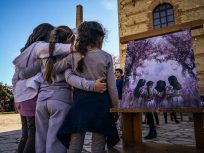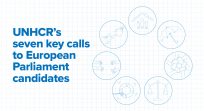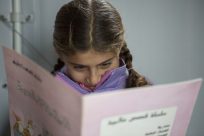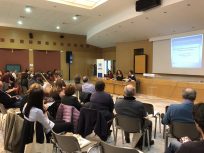UNHCR study shows rapid deterioration in living conditions of Syrian refugees in Jordan
UN High Commissioner for Refugees António Guterres says large numbers of Syrian refugees are sliding into abject poverty, and at an alarming rate, due to the magnitude of the crisis and insufficient support from the international community.
He made the statement at the launch of a new UNHCR study, Living in the Shadows, which reveals evidence of a deepening humanitarian crisis. High Commissioner Guterres is on a two-day visit to Jordan, where he will meet refugees profiled in the study in Amman and others at the Za’atari refugee camp.
“I am here to express my solidarity with Syrian refugees, as the impact of snowstorm Huda is still tangible and posing an even greater strain on their already dire living conditions.” Guterres is also meeting with Jordanian officials and with donors to coordinate efforts to improve living conditions for Syrian refugees and support the communities hosting them.
Conducted by UNHCR and International Relief and Development (IRD) the study is based on data from home visits with almost 150,000 Syrian refugees living outside of camps in Jordan in 2014.
According to the study, two-thirds of refugees across Jordan are now living below the national poverty line, and one in six Syrian refugee households is in abject poverty, with less than $40 per person per month to make ends meet.
Almost half of the households researchers visited had no heating, a quarter had unreliable electricity, and 20 per cent had no functioning toilet. Rental costs accounted for more than half of household expenditures, and refugee families were increasingly being forced to share accommodations with others to reduce costs.
“Unless the international community increases its support to refugees, families will opt for ever more drastic coping strategies,” Guterres said. “More children will drop out of school to work and more women will be at risk of exploitation, including survival sex.”
As the Syrian conflict approaches its fifth year, many refugees are becoming increasingly dependent on assistance. Jordan’s resources and infrastructure, too, have been stretched to the limit.
In an effort to address this critical situation, UNHCR is providing monthly cash assistance to 21,000 of the most vulnerable Syrian families, or 14 per cent of the Syrian refugee population living outside camps. As of the end of 2014, over 10,000 additional Syrian refugee households have been identified as eligible for such assistance but, due to lack of funds, cannot be provided with support.
Overall, the report’s findings make it clear that any further reductions in the current levels of support will have immediate and serious consequences for Syrian refugees in Jordan. The situation is particularly worrying for the most vulnerable populations, such as female-headed households and elderly refugees.
Guterres emphasized that this crisis can be mitigated if the international community steps up efforts to alleviate the suffering of the refugees. He praised the efforts of the Jordanian authorities, UNHCR and its partners to address the urgent needs of refugees during last week’s heavy snowstorm.
In total, Jordan has a registered Syrian refugee population of 620,000, some 84 per cent of whom live outside camps.
“This represents a dramatic pressure in the economy and the society of the country not to mention the terrible security impact of the Syria crisis in itself,” Guterres said.
“The generosity of the Jordanian people and the Government needs to be matched by massive support from the international community – support for the refugees themselves and for the local populations hosting them, but also structural and budgetary support to the Jordanian Government for education, health, water and sanitation and electricity to enable it to cope with this enormous challenge.”
Additional Information:
– The “Living in the Shadows” report is available on our media page at: http://unhcr.org/jordan2014urbanreport/.
Page 14 of 26
-

Deadly shipwreck off Lesvos island claims seven lives
11 Jun 2019UNHCR, the UN Refugee Agency, is deeply saddened at reports today of seven dead, including two children, after their boat sank in the Aegean Sea off the Greek island of Lesvos. The Hellenic Coast Guard has taken 57 survivors to the port town of Mytilene. UNHCR staff are on the […]
-

“A home away from home”- Results of the National Student Contest on refugees
4 Jun 2019UNHCR, the UN Refugee Agency, in Greece in cooperation with the interagency Youth Awareness Committee1, is pleased to announce the results of “A home away from home”, the 22nd National Student Contest on refugees, organized for the school year 2018-2019. More than two thousand students, including refugees, participated in this […]
-

It could be me – It could be you: School festivals bring young voices together
9 May 2019More than 2,600 primary and secondary school students, including refugee children, in 120 schools around Greece will present a series of collaborative artistic festivals this month, posing the question “Could it be me? Could it be you?” and exploring issues of co-existence and solidarity with refugees. The school festivals and […]
-

UNHCR calls on Greece’s future members of European Parliament to strengthen refugee protection
7 May 2019UNHCR, the UN Refugee Agency, is today urging Greece’s candidates for the next European Parliament to adopt seven key calls to strengthen refugee protection within and beyond the borders of the European Union. Members of the next European Parliament have a unique and important opportunity to better protect refugees in […]
-

UNHCR joins Thessaloniki Book Fair’s “Imagine all the people”
6 May 2019UNHCR, the UN Refugee Agency, is participating this year at the 16th International Book Fair in Thessaloniki (TBF), with a series of activities and discussions to bring forward refugee voices and stories, their artistic expression and contribution to our common cultural heritage. These include a roundtable on the link between […]
-

Racist Violence Reporting Network: Annual Report 2018
18 Apr 2019The Racist Violence Recording Network (RVRN) presented yesterday their annual report, which analyses findings of racist violence and hate crime across Greece in 2018, recorded by the 46 organizations participating in the Network. From January to December 2018, the RVRN documented, through interviews with victims, 117 incidents of racist violence, […]
-

The Greek reality of racist violence: from extremist racist groups to “everyday” racism
12 Apr 2019INVITATION – PRESS RELEASE Press Conference on 2018 Annual Report The Greek reality of racist violence: from extremist racist groups to “everyday” racism Athens, 12.4.2019 – The Racist Violence Recording Network (RVRN) is organizing a Press Conference to present its findings based on the recordings in 2018. […]
-

Education Ministry, in cooperation with UNHCR, holds a conference on the education of refugee children on the Greek Aegean islands
4 Apr 2019Refugee children’s access to formal education on the Greek islands in the North and South Aegean, their ongoing needs, challenges, and good practices were the main issues discussed at a conference last month held by the Department for the Coordination and Monitoring of the Refugee Education of the Ministry of […]
-

UNHCR welcomes Greek government measures to strengthen refugee integration
15 Mar 2019UNHCR, the UN Refugee Agency, welcomes a set of concrete actions announced by the Greek Ministry of Migration Policy to support refugees in accessing gainful employment and social solidarity safety nets as they integrate in Greece. The measures are part of Greece’s ongoing efforts to operationalize the 2018 National Integration […]
-

UNHCR saddened at news of deaths off the Greek island of Samos
7 Mar 2019UNHCR, the UN Refugee Agency, is deeply saddened at news that two young children and a man died off Samos island after their boat capsized in rough waters in the early hours of 7 March. Nine people were rescued by the Hellenic Coast Guard. The shipwreck is the first in […]
